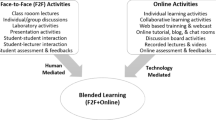Abstract
The aim of the study was to investigate neutralisation techniques used by lecturers to justify their resistance behaviours during the implementation of learning management systems (LMS) in higher educational institutions (HEIs). Moreover, we explored why lecturers employed such neutralisation techniques to justify their resistance behaviours. A number of studies identified resistance as a barrier to successful implementation of technology in HEIs. However, there is a dearth of literature on the choice of neutralisation techniques employed by lecturers to justify such resistance behaviours. Understanding the logic behind the choice of neutralisation techniques could ensure effective management strategies towards user resistance, which could further assist to improve technology uptake in HEIs. The study draws from Bourdieu’s theory of practice (ToP) as a lens to investigate the logic behind the use of certain neutralisation techniques to justify user resistance. The research used cross-sectional data from semi-structured interviews and participant observations of a single in-depth case setting. The most common neutralisation technique used by lecturers was condemn the condemners followed by denial of responsibility, denial of injury, and appeal to higher loyalties. Findings suggest that the habitus and capital of lecturers significantly influence the choice of techniques to justify resistance. Lecturers tended to neutralise before they resisted, such that they prepared themselves to justify any deviance well in advance in case they got caught. Integration of ToP and Neutralisation theory enriches theorisation of user resistance, enabling development of mechanisms that could effectively manage lecturer resistance behaviours to improve uptake of LMS in HEIs.



Similar content being viewed by others
References
Albugami, S., & Ahmed, V. (2015). Success factors for ICT implementation in Saudi secondary schools: From the perspective of ICT directors, head teachers, teachers and students. International Journal of Education and Development Using Information and Communication Technology,11(1), 36–54.
Al-Busaidi, K. A., & Al-Shihi, O. H. (2012). Critical factors influencing instructor’s acceptance and use of learning management systems. In R. Babo & A. Azevedo (Eds.), Higher education institutions and learning management systems: Adoption and standardization (pp. 116–141). Hershey: Information Science Reference.
AlQudah, A. A. (2014). Accepting Moodle by academic staff at the University of Jordan: Applying and extending TAM in technical support factors. European Scientific Journal,10(18), 183–200.
Auriacombe, C., & Mouton, J. (2007). Qualitative field research. Journal of Public Administration,42(6), 441–457.
Bagayogo, F., Beaudry, A., & Lapointe, L. (2013). Impacts of IT acceptance and resistance behaviors: A novel framework. In Proceedings of the 34th international conference on information systems, Milan, Italy.
Barlow, J. B., Warkentin, M., Ormond, D., & Dennis, A. R. (2013). Don’t make excuses! Discouraging neutralization to reduce IT policy violation. Computers and Security,39, 145–159.
Blin, F., & Munro, M. (2008). Why hasn’t technology disrupted academics’ teaching practices? Understanding resistance to change through the lens of activity theory. Computers & Education,50(2), 475–490.
Bourdieu, P. (1977). Outline of a theory of practice. Cambridge: Cambridge University Press.
Bourdieu, P. (1984). Distinction: A social critique of the judgement of taste. Cambridge: Havard University Press.
Bourdieu, P. (1986). The forms of capital handbook of theory and research for the sociology of education. In R. A. Caro (Ed.), The power broker: Robert Moses and the fall of New York (pp. 241–258). New York: Alfred A Knopf Incorporated.
Bourdieu, P. (1990). The logic of practice. California: Stanford University Press.
Bourdieu, P., & Wacquant, L. (1992). An invitation to reflexive sociology. Chicago: Chicago University Press.
Braun, V., & Clarke, V. (2006). Using thematic analysis in psychology. Qualitative Research in Psychology,3(2), 77–101.
Canchu, L., Singer, R., & Ha, L. (2010). Why university members use and resist technology? A structure enactment perspective. Journal of Computing in Higher Education,22(1), 38–59.
Cole, J., & Foster, H. (2007). Using Moodle: Teaching with the popular open source course management system (2nd ed.). Newton: O’Reilly Media Inc.
Costello, E. (2013). Opening up to open source: Looking at how moodle was adopted in higher education. Open Learning,28(3), 187–200.
Cromwell, P., & Thurman, Q. (2003). The devil made me do it: Use of neutralizations by shoplifters. Deviant Behavior,24(6), 535–550.
Davis, F. D. (1989). Perceived usefulness, perceived ease of use, and user acceptance of information technology. MIS Quarterly,13(3), 319.
Garg, A., Shukla, B., & Kendall, G. (2015). Barriers to implementation of IT in educational institutions. The International Journal of Information and Learning Technology,32(2), 94–108.
Garrett, D. E., Bradford, J. L., Meyers, R. A., Becker, J., Garrett Jeffrey, L., Bradford Ren, D. E., et al. (1989). Issues management and organizational accounts: An analysis of corporate responses to accusations of unethical business practices. Journal of Business Ethics,8(7), 507–520.
Grenfell, M. (2008). Pierre Bourdieu: Key concepts. Stockfield: Acumen Publishing Limited.
Grenfell, M., & James, D. (1998). Bourdieu and education: Acts of practical theory. London: Falmer Press.
Haag, S., & Eckhardt, A. (2015). Justifying shadow IT usage. In Pacific Asia conference on information systems proceedings (p. 241).
Harris, L. C., & Daunt, K. L. (2011). Deviant customer behaviour: A study of techniques of neutralisation. Journal of Marketing Management,27(7–8), 834–853.
Hinduja, S. (2007). Neutralization theory and online software piracy: An empirical analysis. Ethics and Information Technology,9(3), 187–204.
Hon, A. H. Y., Bloom, M., & Crant, J. M. (2014). Overcoming resistance to change and enhancing creative performance. Journal of Management,40(3), 919–941.
Howard, S. K. (2013). Risk-aversion: Understanding teachers’ resistance to technology integration. Technology, Pedagogy and Education,22(3), 357–372.
Ignatow, G., & Robinson, L. (2017). Pierre Bourdieu: Theorizing the digital. Information, Communication & Society,20(7), 950–966.
ITU. (2017). ICT facts and figures 2017. International Telecommunication Union. https://doi.org/10.1787/9789264202085-5-en.
Joshi, K. (1991). A model of user’s perspective on change: The case of information systems technology implementation. MIS Quarterly,15(2), 229–242.
Klockars, C. B. (1974). The professional fence. New York: Free Press.
Lapointe, L., & Rivard, S. (2005). A multilevel model of resistance to information technology implementation. MIS Quarterly,29(3), 461–491.
Laumer, S. (2011). Why do people reject technologies—A literature-based discussion of the Phenomena “Resistance to Change” in information systems and managerial psychology research. In Proceedings of the European conference on information systems. Retrieved August 14, 2017 from https://aisel.aisnet.org/ecis2011/60.
Lee, A. S., & Baskerville, R. L. (2003). Generalizing generalizability in information systems research. Information Systems Research,14(3), 221–243.
Liddick, D. (2013). Techniques of neutralization and animal rights activists. Deviant Behavior,34(8), 618–634.
Lin, T., Huang, S., & Chiang, S. (2018). User resistance to the implementation of information systems: A psychological contract breach perspective. Journal of the Association for Information Systems,19(4), 306–332.
Mahmud, I., Ramayah, T., & Kurnia, S. (2017). To use or not to use: Modelling end user grumbling as user resistance in pre-implementation stage of enterprise resource planning system. Information Systems,69, 164–179.
Marakas, G. M., & Hornik, S. (1996). Passive resistance misuse: Overt support and covert recalcitrance in IS implementation. European Journal of Information Systems,5(3), 208–219.
Markus, M. L. (1983). Power, politics, and MIS implementation. Communications of the ACM,26(6), 430–444.
Martín-Blas, T., & Serrano-Fernández, A. (2009). The role of new technologies in the learning process: Moodle as a teaching tool in physics. Computers & Education,52(1), 35–44.
Minor, W. W. (1981). Techniques of neutralization: A reconceptualization and empirical examination. Journal of Research in Crime and Deliquency,18(2), 295–318.
Mutch, C. (2006). Adapting Bourdieu’s field theory to explain decision-making processes in educational policy. In V. A. Anfara Jr. & N. T. Mertz (Eds.), Theoretical frameworks in qualitative research (Vol. 1, pp. 155–174). Thousand Oaks: Sage.
Myers, M. D., & Newman, M. (2007). The qualitative interview in IS research: Examining the craft. Information and Organization,17(1), 2–26.
Nawaz, A. (2013). Using e-learning as a tool for ‘education for all’ in developing states. International Journal of Science and Technology,4(3), 38–46.
Orlikowski, W. (2000). Using technology and constituting structures: A practice lens for studying technology in organizations. Organization Science,11(4), 404–428.
Piquero, N. L., Tibbetts, S. G., & Blankenship, M. B. (2005). Examining the role of differential association and techniques of neutralization in explaining corporate crime. Deviant Behavior,26(2), 159–188.
Rogers, E. M. (1962). Diffusion of innovations (1st ed.). New York: The Free Press.
Sakala, L., & Chigona, W. (2017). Lecturer resistance during ICTs implementation in higher education in Zimbabwe: Forms and triggers. In Proceedings of the South African institute of computer scientists and information technologists (p. 31). ACM.
Samhan, B. (2018). Revisiting technology resistance: current insights and future directions. Australasian Journal of Information Systems,22, 1–11.
Schultze, U., & Boland, R., Jr. (2000). Place, space and knowledge work: A study of outsourced computer systems administrators. Accounting, Management and Information Technologies,10(3), 187–219.
Seale, C. (1999). Quality in qualitative research. Qualitative Inquiry,5(4), 465–478.
Selander, L., & Henfridsson, O. (2012). Cynicism as user resistance in IT implementation. Information Systems Journal,22(4), 289–312.
Sinkovics, R. R., Penz, E., & Ghauri, P. N. (2008). Enhancing the trustworthiness of qualitative research in international business. Management International Review,48(6), 689–714.
Siponen, M., & Vance, A. (2010). Neutralization: New insights into the problem of employee information systems security policy violations. MIS Quarterly-Special Issue,34(3), 487–502.
Siponen, M., Vance, A., & Willison, R. (2012). New insights into the problem of software piracy: The effects of neutralization, shame, and moral beliefs. Information & Management,49(7–8), 334–341.
Sykes, G. M., & Matza, D. (1957). Techniques of neutralization: A theory of delinquency. American Sociological Association,22(6), 664–670.
Vinthagen, S., & Johansson, A. (2013). “Everyday resistance”: Exploration of a concept and its theories. Resistance Studies Magazine,1(1), 1–46.
Walsham, G. (1995). Interpretive case studies in IS research: Nature and method. European Journal of Information Systems,4(2), 74–81.
Watty, K., McKay, J., & Ngo, L. (2016). Innovators or inhibitors? Accounting faculty resistance to new educational technologies in higher education. Journal of Accounting Education,36, 1–15.
Willison, R., & Warkentin, M. (2013). Beyond deterrence: An expanded view of employee computer abuse. MIS Quarterly,37(1), 1–20.
World Economic Forum. (2015). The global information technology report 2015. World Economic Forum. https://doi.org/10.3359/oz0304203.
Yin, R. K. (2013). Analysing case study evidence—How to start your analysis, your analytic choices and how they work. In R. K. Yin (Ed.), Case study research: Design and methods (pp. 127–164). Thousand Oaks: Sage.
Author information
Authors and Affiliations
Corresponding author
Ethics declarations
Conflict of interest
The authors declare that they have no conflict of interest.
Additional information
Publisher's Note
Springer Nature remains neutral with regard to jurisdictional claims in published maps and institutional affiliations.
Rights and permissions
About this article
Cite this article
Sakala, L.C., Chigona, W. How lecturers neutralize resistance to the implementation of learning management systems in higher education. J Comput High Educ 32, 365–388 (2020). https://doi.org/10.1007/s12528-019-09238-7
Published:
Issue Date:
DOI: https://doi.org/10.1007/s12528-019-09238-7




